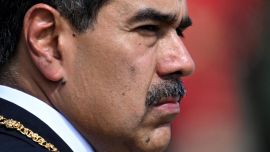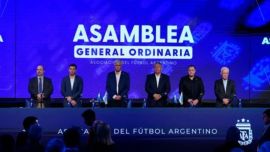President Mauricio Macri called on the region to resolve tensions "with more democracy and dialogue" on Thursday, referencing crises in Bolivia, Chile, Colombia, Ecuador and Venezuela as he made his final foreign trip on Thursday to Brazil for a Mercosur summit.
"Problems in democracy are solved with more democracy and more dialogue," said the president, as he took the floor during the summit in Bento Gonçalves, Rio Grande do Sul, five days before he hands over power to president-elect Alberto Fernández.
Macri also called on members to more forward with a "convergence with the countries the Pacific Alliance."
Brazil's outspoken President Jair Bolsonaro took on a less friendly tone. He urged the South American four-nation bloc to push ahead with reforms "without accepting ideological setbacks," in a clear swipe at Fernández.
Recent elections have laid bare ideological divisions in the group, particularly between its two biggest members Brazil and Argentina, threatening to hamper ratification of June's historic Free Trade Agreement with the European Union.
"We need to carry out the reforms that are giving vitality to Mercosur, without accepting ideological setbacks," Bolsonaro said, in clear reference to the incoming Peronist government in Argentina.
Bolsonaro, who said Wednesday that Buenos Aires had "much more" to lose in case of tensions with Brasilia than vice-versa, will snub Fernández's inauguration next week. Bolsonaro has threatened to leave Mercosur, worried that Fernández will fall back on protectionism.
Brazil is Argentina's largest trading partner, and Argentina is Brazil's third-largest, behind China and the United States.
Macri said the group should continue "to negotiate agreements that allow us into the global economy."
"Over these years, we have generated with the Mercosur a space for understanding, consolidation, dynamism that should not be abandoned," said the outgoing head of state.
Tensions
The political crisis in Bolivia also got a mention at the summit, with Argentina, Brazil and Paraguay expressing support for right-wing interim President Jeanine Anez. However, Uruguay's outgoing leftist Vice-President Lucia Topolanksy said the fall of Evo Morales marked a "constitutional rupture."
In his own comments, Macri said "elections are the only way to channel the will of the Bolivian people and the mechanisms provided for it in its Constitution are what will allow this situation to be resolved."
The bloc's two-day summit comes after US President Donald Trump announced plans Monday to impose tariffs on steel and aluminum from Argentina and Brazil. The Republican leader accused them of manipulating their currencies to gain an unfair advantage for agricultural exports, thereby hurting US farmers.
Both countries stepped in to replace US exports of soybeans and other agricultural goods to China, benefitting from the US trade war with the Asian giant.
The four countries were to discuss the reduction of the Common External Tariff and the increase in the rate of imports from third countries.
"Excessive pricing affects competitiveness and is detrimental to those who produce," Bolsonaro told the meeting.
"Brazil relies on commercial openness as a development tool."
– TIMES/AFP/AP


























Comments